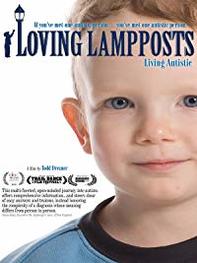 Loving Lampposts is a thoughtful and intelligent documentary by Todd Drezner about autism, neurodiversity, society’s viewpoint of the diagnosis and how that impacts the way we treat autistic individuals, both medically and personally. I was excited to see that this balanced and open minded film is available on Netflix instant watch. Drezner’s son Sam, was diagnosed with PDD-NOS as a toddler. He seems to be an easy-going child, although quirky and not very social. (I won’t say “high functioning”, because the film offers a thought provoking conversation on that term.) The film’s title comes from Sam’s early special interest in and connection to a group of lampposts near his home. Visiting the lampposts is an important ritual for Sam as a child. But the film is much more than a look at one family’s experience with their special needs child. Drenzer thoughtfully examines the big questions about whether autism is an illness to be cured or a difference to be accepted. In his interview with Steve Silberman of the blog Neurotribes, Drenzer discusses how he views autism as a difference as well as a disability. I appreciate this realistic and still respectful stance. In the documentary, Drenzer manages to interview many of the big names in autism science, such as Simon Baron-Cohen, and Paul Offit. He talks to parents of autistic children, like AutismVox blogger Christina Chew, and author Roy Grinker, and autism Playboy Bunny Jenny McCarthy. The most exciting group in the film is the widely diverse group of autistic adults represented. So often the focus of research, treatment and policy is on children, leaving autistic adults as the forgotten majority. Drenzer talks to artist Dora Raymaker of AASPIRE, Sharisa Joy Kochmeister of AutCom, author Stephen Shore, as well as others. The film celebrate the gifts these individuals bring, while not ignoring their difficulties. Loving Lampposts is entertaining and informative, well worth watching. 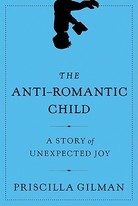 There are a lot of books written by mothers about raising their special needs children, some excellent, some not so great, most somewhere in the middle. The Anti-Romantic Child, A Story of Unexpected Joy , by Priscilla Gilman is both beautifully written, inspiring and dramatic, and also a bit different than the other books in this genre. That’s due to the author, who is not only a mother, but also a former professor of English literature. Gilman weaves together her interest in Wordworth’s poetry with her experiences in raising her special needs son in a way that brings deeper meaning to both. The Anti-Romantic Child is about Gilman’s son Benj, a boy exhibiting hyperlexia, as well as autistic characteristics, such as rigid behaviors and deficits in social skills. Hyperlexia is characterized by interest in words and exceptional reading skills along with difficulty with reading comprehension. Hyperlexic individuals frequently have social problems and other developmental delays. Gilman carefully discusses the unusual issues her son has, such as sensory sensitivities, and a tendency toward OCD and rigid behavior, without ever putting him into a labelled box. What makes Gilman’s book so fascinating is how she uses the abstract and ambiguous natures of poetry to further her own understanding of her son’s development. Because Gilman was a literature professor, she has a skill in presenting the poetry in a way that enhances the understanding of both the developmental issues and the poetry. Since I was trained as an engineer, with MIT’s minimal literature requirements, I’ve rarely had that experience. Like all the mother/authors I’ve read, Gilman has great dreams for her son, and fights to help him attain them. The difference in this book is the eloquence of how she expresses these dreams for Benj: “That he be seen as whole against the sky. That he not suffer beyond his and my capacity to bear it. That he be allowed to enjoy the pleasures of 'his own private nook' and come out of that nook for joyful engagement with others. That he always hold on to his visionary gleam, his bright radiance.” This book has a bright radiance all its own. 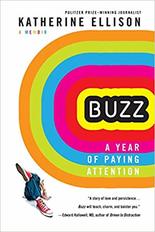 “Well written, compassionate, interesting” are all words I’d use to describe Buzz, A Year of Paying Attention, A Memoir by Katherine Ellison. But even though I enjoyed it, I struggled with the concept of the book and came away feeling vaguely unsettled. Ellison describes her plan to devote a year in which she’d “put other work aside, making it my full-time job to seek the best path for a distracted parent intent on helping her distracted child.” I always appreciate well written books that combine information with a chance to really get to know the author’s experiences. Ellison, a Pulitzer Prize-winning journalist, has the ability and the connections to do just that. She meets experts such a Dr Russell Barkley, and authors like Dr Daniel Amen, and Blake Taylor. She quotes from Dr Ross Greene, Dr John Ratey and Dr. Edward Hallowell. (Greene and Hallowell even write blurbs for the for the book cover.) It’s not surprising that an author who describes herself as having ADHD would take a creative and enthusiastic approach to exploring the different ways to manage ADHD. But it was also not surprising that this style resulted in a somewhat scattered attempt to solve a very challenging issue. I kept wanting more depth and focus, and I kept hoping the author would stick with something long enough to really give it a chance. I kept looking for more scientific inquiry and less anecdotal evidence. So often I hear from parents that they’re looking for a clear cut diagnosis, with a solid recommendation on what to do to help their child. Unfortunately, it’s just not that straightforward. Although a one size fits all diagnosis and treatment plan might be comforting, it’s never going to work as well as something tailored specifically. There is no one path, or one best treatment, and dabbling in different solutions over the course of a year is not going to result in the best outcome. As for Buzz, I’d still recommend it, but I’d suggest thinking of the book as a chance to understand someone else’s experiences with a challenging child, not as a way to learn how to help your own child. 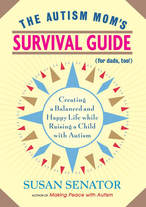 A while back, someone sent me a copy of Susan Senator’s The Autism Mom’s Survival Guide. Susan Senator is a gifted writer, with a blog as well as an earlier book about raising her autistic son. Susan Senator writes with a personal, honest voice that feels like you’re talking with a close friend over a cup of tea. Although I read the book immediately, and keep recommending it to friends and clients, somehow I’ve never reviewed it for my blog. I thought now would be a good time to rectify that lapse. The Autism Mom’s Survival Guide is really all about taking care of yourself at the same time you’re taking care of your special needs child, as well as the rest of your family. Senator writes from her own perspective, as well as compiling the advice of other autism parents. For parents who may feel like they’re all alone, judged by others and not measuring up, this voice from a community of others in the same situation can be a valuable support. My favorite part of the book comes when Senator writes in her own voice, as the mother of a now grown autistic child. Her compassion as she looks back on her own young self, raising her small child, was touching, and just what every young mother needs to hear. This book is a gift for all parents of special needs kids, a book to pull out when you feel like no one understands, or that you’re all alone. I think every family wants what's best for their autistic child, and one of their biggest worries is divorce. It's not surprising, since popular culture so often states that 80% of families with autistic children get divorced. Thankfully, that statistic seems to be more widespread than valid. I’ve published a few posts on the theme of divorce statistics among families with autistic children. You can find more details about divorce rates in the Kennedy Krieger studyand the Easter Seals survey.
Fortunately, it’s an intriguing issue, and researchers continue to investigate the question. Recently, The Journal of Family Psychology published a study by Sigan Hartley, in which she looked at 406 families of autistic children, as well as an equal number of parents of typical children. The study found that divorce rates were equal up to the child's age of eight, after which time the parents of autistic children were more likely to divorce. The study found a 23% divorce rate for the autistic families, compared to 14% for the typical families, still a far cry from the often reported 80% rate. Hartley suggests that the difference in rate found between this study and the Kennedy Krieger study was due to the age differences of the children. The Kennedy Kreiger study, which found equal divorces rates regardless of the presence of autistic children, looked at children under 17, while Hartley’s study included children into middle age. Clearly, this is not a simple question, and more research will give us more details. But, the good news is that most families do manage to stay intact, regardless of their children's diagnoses. 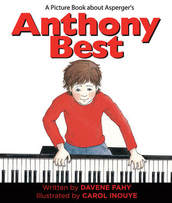 One of the hardest parts about the autism spectrum can be the feeling of separation it brings about. Adults on the spectrum may feel isolated and different than other people they live and work with. Parents of autistic kids can feel judged and criticized by other parents, especially those with easy children. Probably most difficult is the children on the spectrum, who often suffer through teasing, bullying or just being left out. I think sometimes this isolation can be toughest for kids in mainstream schools, where their academic abilities are strong, but their social skills keep them from connecting with classmates. So often, the typical kids don’t understand what’s different about their autistic classmates and neighbors, so they might view autistic behaviors as mean or unfriendly. And the sad result is that the autistic kids get left out. Education and communication can go a long way toward creating understanding, and books can be the best way to start that conversation. One sweet picture book I recently read is Anthony Best by Davene Fahy. In this simple book, Fahy explores the relationship between Anthony, a child on the autism spectrum, and his neighbor Hannah. The book illustrates many of the behaviors that might be puzzling or upsetting to neurotypical children, such as stimming behaviors, lack of eye contact, and communication differences. These behaviors are presented in a simple, non-judging way, which leaves plenty of space to have a conversation with young readers. If you have a child on the spectrum, or with behavioral or learning differences, this book could be a good choice to present to neighbors or friends who want their children to learn a bit more about how differences don’t have to keep kids from being friends. And, Anthony Best would be a nice book for any teacher to have in the classroom. 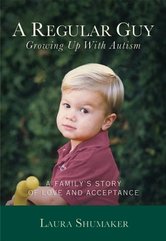 The Autism Spectrum is so broad, the gifts and difficulties so varied, that people often tell me about how they feel alone, that their experiences are different than others, and no one understands what they’re going through. And, for those raising a child on the spectrum, there are ongoing challenges that can feel very isolating for parents as well as kids. It starts with noticing something concerning about a child, then moves to dealing with the medical professionals, getting the right diagnosis, finding the right services and the appropriate educational setting. Sadly, the typical world can be a harsh and judging critic along the way. And the difficulties don’t end in adulthood, because often special needs adults need individualized plans to ensure appropriate employment and living situations. Because each child is so different, it’s not a one size fits all situation. That’s one way that books and blogs can be vital, as the link connecting individuals, showing people that they’re not alone and others might be going through a very similar struggle. A Regular Guy: Growing up with Autism , by Laura Shumaker is an excellent example of a book that helps create that connection for parents raising kids with special needs. Shumaker chronicles her struggles with the medical profession, helping her son find the right school setting, and to fit in with neighbors and friends. She’s honest about her family’s struggles, and compassionately attuned to the pain her son goes through as well. The hardest parts of the book are those describing the many tough decisions Shumaker is forced to make, often for her son’s own good, but also hard for him to accept. I recommend this insightful book for any parent dealing with those tough choices, and anyone feeling isolated or judged by their parenting situation. 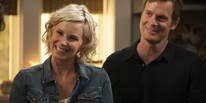 I'm never quite up to date on TV viewing, since I watch everything off my DVR, so I'm commenting about a show from a few weeks ago. Parenthood, Season 2, Episode 4, which features a family dealing with a child's Asperger's, talked about the dreaded divorce statistic "80% of families with an autistic kid get divorced." Fortunately, that's just not true. The 80% statistic is an enduring myth I see quoted frequently, but studies just don't back it up. The divorce rate seems to be about the same, whether a child is autistic or not. Even worse, the show quoted that the character's therapist told her that it was true. Lesson 1: Don't believe everything your therapist tells you! Lesson 2: Just because your child is autistic, doesn't mean you're doomed to divorce. You can read an earlier discussion of this topic on my Divorce and Autismpost. Please don't skip the show because of one bad statistic. Autistic kids are varied, and every family is different, but in general, Parenthood seems to do a pretty good job of presenting the joys and struggles of raising an autistic child. I recently got an email from a researcher at Columbia University. They’re doing a study on parents of children with autism, and looking for parents to participate. Here’s an excerpt from their email if you’re interested.
“We are researchers at Columbia University's Institute for Social and Economic Research and Policy studying autism. We are currently collecting life stories from parents about their experiences in recognizing their child's autism, seeking professional help and navigating the available service systems. We think participation in this study would be of great interest to your readers, and we would like to invite you to write about our survey on your blog. The goal of this project is to gain a better understanding of the road to diagnosis. Parents have different experiences and observations of their child's development and they have different personal resources with which they access care and services. Parents also differ in the type and extent of their support networks and social relations. And finally parents make different decisions in their quest for obtaining the right diagnosis and care for their child. We would like to give parents the chance to tell their stories. Participation in the survey may help us understand the heterogeneity of autism as well as how children develop over time. We are collecting life stories of parents of children who have autism through an online semi-structured survey at our website, http://www.understandingautism.columbia.edu. You could help our research tremendously by encouraging parents to participate in our study.” Please consider going to the website and sharing your story. As summer draws to a close, and the new school year is fast approaching, I start thinking of what will make this year easier and more successful than the year before, for my clients, their families, and my readers. This post is a reprint of an article I posted on Ezinearticles.com back in August of 2008, but I think the information is still useful and relevant. For more back to school tips, you can also check out my back to school post from last August, which focused more on the social and emotional aspects of returning to school.
Back to school can be a busy and challenging time and it’s easy to let things slide in the beginning of the school year. But, if your child struggled with school last year, whether academically, with behavior or organization, or with social skills and friends, it’s important to take a few steps now. If your child has special needs, like autism, Asperger’s, ADHD, or learning differences, an early plan is especially important. The good news is that it doesn’t have to be a lot of work, and the payoff is huge. A few conversations now, a couple of systems established, and the year will run more smoothly. Try these tips to get off to a great start. Attend Back to School Night Back to school night may be the only opportunity to meet your child’s teacher until the first report cards come out. The benefits of this meeting are twofold. First, it shows your child’s teacher that you’re an involved parent. While most teachers really try to treat all kids equally and fairly, they’re only human. The child with the parent who is paying attention may be less likely to be overlooked in a crowded classroom, and it’s easier for a teacher to contact a parent who has been introduced. In addition, this meeting is your chance to find out what the teacher is expecting. What is the system for assigning and collecting homework? How much time is homework expected to take? What should the parents do if the homework is taking too long? Are parents expected to help with homework? How will the teacher communicate with the parents, and how can you best contact the teacher? These are all questions for which you as a parent need answers. Discuss these issues with your child too. Often, the teacher will tell the parents one thing, but the kids may understand something else entirely. Put Together a List of Classmates and Phone Numbers The beginning of the school year is the perfect time to have your child put together a list of classmates and their phone numbers. You don’t need the whole class, just a few from each subject. Chances are, your child will not be perfect this year. It’s easy to misplace a paper, forget a book or write down an assignment incorrectly. It’s best to let this be your child’s problem, but the classmate list makes it easy for your child to find a solution. Think About Special Services Schools can be overcrowded and underfunded. As the school year goes on, the waiting lists grow. I worked as a school therapist for years, and every year, it was the same pattern. Things started slowly in September, but by February, my waiting list was so long, I couldn’t possibly fit in another student. Many parents want to give things a fresh start in the new school year, and that may be a good idea. At the same time, it doesn’t hurt to explore the support services. Find out how far in advance you’ll need to request homework support, special testing, or tutoring. You don’t want to give problems time to grow, only to find out that the help you need won’t be available until the following year. Also, check and see if you need to make requests in writing. Too often parents are patiently and cooperatively waiting in a “verbal” line, only to find out later that the countdown for services doesn’t even start until they make a written request. Set Up a Homework System at Home Just as a good teacher will start the year with a plan for homework, assignments, and communication in the classroom, you should do these same things at home. Work with your child to figure out where and when homework will be done. How will your child get you the papers you need to review? The less naturally organized you and your child are, the more time and effort you should put into this upfront plan. It will be easier to start with a system and then modify it if it’s not working than to try to dig out of chaos in the middle of the year. Take advantage of the beginning of the year enthusiasm, and the fact that there is no old work to catch up on. Don’t Forget Social Issues If your child has struggled socially in the past, the new school year can be the best time to tackle those issues. Take time with your child to discuss potential friends in the new classroom. Since many kids move over the summer, and most schools shift the students every year, lots of kids will be looking for new friends. Are some of these kids potential friends for your child? Think now about play dates and activities. It can be tough to join into a dance class or a team after it’s established, but being an early member makes your child an automatic insider. And for parents, often the first few days of school are the times it’s easiest to meet other parents. These simple steps may be tough to manage in those busy first weeks of school, but it’s worth it. Try to think of this as an investment for a smooth and successful new year. |
Patricia Robinson MFT
I'm a licensed therapist in Danville, California and a coach for Asperger's and ADHD nationwide. I work with individuals of all ages who have special needs, like Autism Spectrum Disorders, ADD, ADHD, and the family members and partners of special needs individuals. Archives
February 2015
Categories
All
|

 RSS Feed
RSS Feed